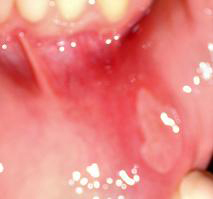 Canker sores are a common, painful sore in the mouth that may appear on the inner portion (mucosa) of the lips and cheeks, or on the gums. Multiple canker sores may appear at the same time.
Canker sores are a common, painful sore in the mouth that may appear on the inner portion (mucosa) of the lips and cheeks, or on the gums. Multiple canker sores may appear at the same time.
A canker sore is not the same as a fever blister (cold sore) that is the result of a herpes virus infection.
The cause of a canker sore usually cannot be determined. However, many cases are thought to be the result of the body’s immune system overreacting to a viral infection elsewhere in the body. Canker sores may also occur after an injury to the mouth following dental work, aggressive tooth brushing, or biting the tongue or cheek.
Canker sores can also be triggered by the following:
- Emotional stress
- Lack of certain vitamins and minerals in the diet (especially iron, folic acid, or vitamin B-12)
- Menstrual periods
The tendency to develop canker sores may run in families.
Symptoms of Canker Sores
Symptoms include:
- One or more painful, red spots or bump that develops into an open ulcer
- Middle of the sore is white or yellow
- Usually small (under 1 cm) but occasionally larger
- Sore may turn gray just before starting to heal
Some cases of canker sores may be associated with fever or swollen lymph nodes (“glands”) in the neck, but these are less common symptoms.
The pain caused by a canker sore usually goes away after 7 -10 days, but it may take 1 - 3 weeks for the sore to completely heal. Large canker sores may take longer to heal.
Treatment of Canker Sores
Most canker sores heal on their own without treatment.
Those with canker sores may wish to avoid eating spicy foods that can irritate the sore.
Rinsing the mouth with salt water may offer some relieve. Some over-the-counter medicines can be applied directly to the sore and offer temporary pain relief.
One home remedy is to create a mixture of 1/2 hydrogen peroxide and 1/2 water. Use a cotton swab to apply the mixture directly to the canker sore. A small dab of Milk of Magnesia may also be applied to the sore with a Q-tip 3-4 times a day. This is soothing and may also help the sore heal.
Prescription medications may be recommended for severe cases, such as fluocinonide gel (Lidex®) or chlorhexidine gluconate mouthwash.
Source: Vivacare
Last updated : 1/8/2019